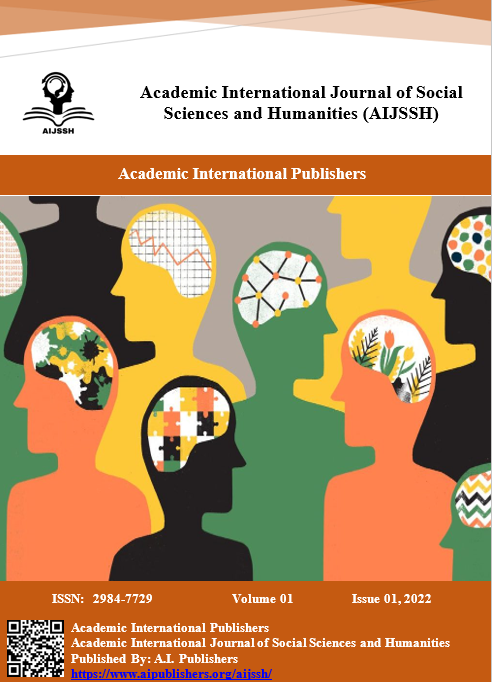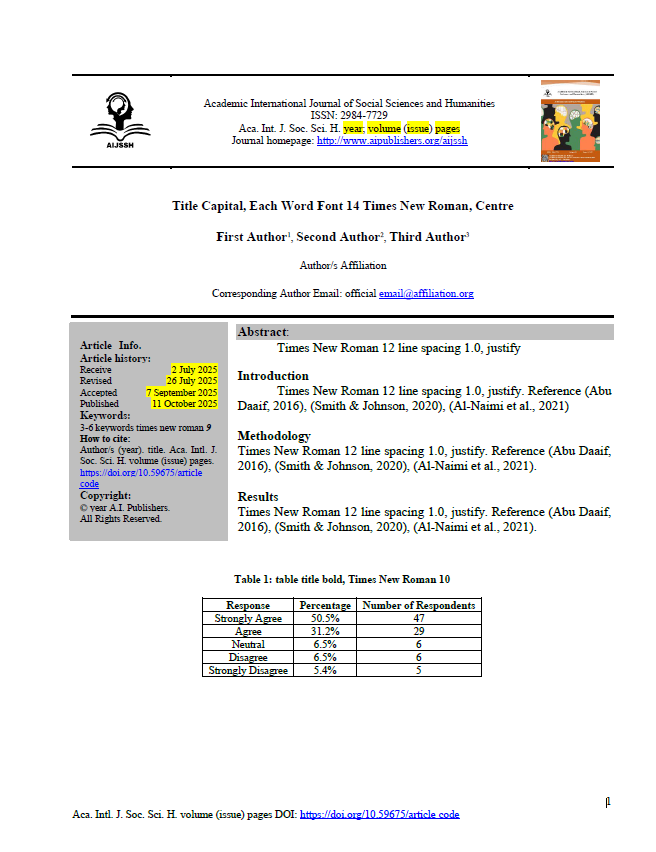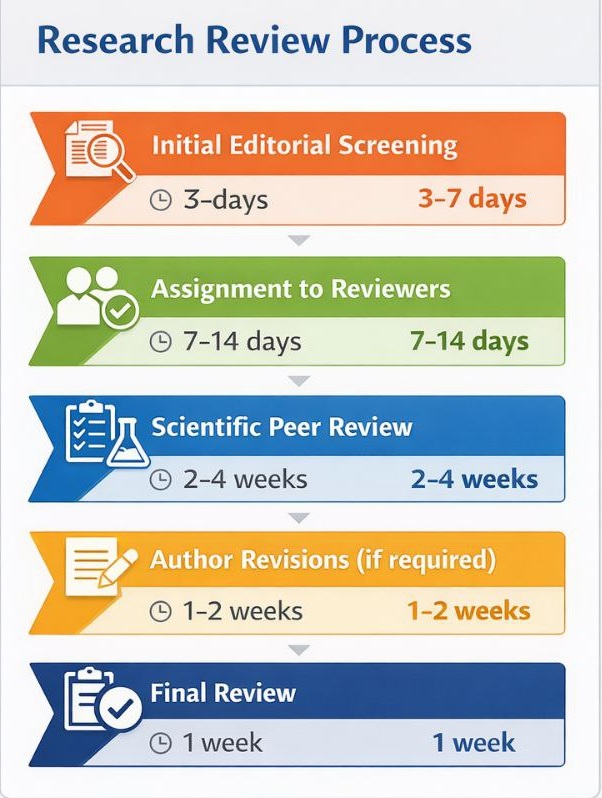The Influence of the Media on Political Decisions
DOI:
https://doi.org/10.59675/S225Keywords:
Media, Politics, Public Opinion, NewsAbstract
The news media's function in contemporary political philosophy is restricted to acting as a go-between for the public and their representatives rather than as a rival source of political power. However, even while politicians continue to make official decisions, the media controls their space. Over the past few decades, political campaigns have evolved in character. In the early 1900s, newspapers were the only media with political influence; they were modified to reflect the impact of radio media on politics. Social media now affects us; later, television influenced society's politics. In addition to elections and political campaigns, social media significantly influences how society thinks about politics. Many researchers' opinions that examined the connection between politics and the media are the main subject of this narrative review and concluded that the leading media, whether they are referred to as "liberal" or "conservative," are vast corporations that are linked to and owned by even more giant conglomerates. They offer a commodity for sale to a market, just like other businesses. Social media has revolutionized politics by providing channels for involvement, mobilization, and interaction that were impossible decades ago. The media significantly impacts politics, elections, and campaigns by determining the critical topics, which candidates will receive the most attention, and what standards they should apply when assessing candidates.
References
Agre, P. E. (2002). Real-time politics: The Internet and the political process. The information society, 18(5), 311-331. DOI: https://doi.org/10.1080/01972240290075174
Al-Badri, L. (2023). The media's role in transmitting cultural dialogue. Academic International Journal of Social Sciences and Humanities, 1(1), 17-21. DOI: https://doi.org/10.59675/S112
Albadri, L. Q. A. (2016). Investigating Readability and Grammaticality of Newspapers Headlines, A Case Study of the Telegraphic and The New York Times (Doctoral dissertation, Sudan University of Science and Technology).
Albadri, L. Q., & Muhamed Badawi, A. M. (2020). Investigating Article Omission in Newspaper Headlines. Dirassat in Humanities & Social Sciences, 3(3).
Anderson, D. M., & Cornfield, M. (Eds.). (2003). The civic web: Online politics and democratic values. Rowman & Littlefield.
Axford, B., & Huggins, R. (Eds.). (2000). New media and politics. Sage, p.224. DOI: https://doi.org/10.4135/9781446218846
Badawi, A. M. M., & Albadri, L. Q. (2022). Analyzing The Use of The Present Simple in Five of The Best Newspapers by Circulation in The English Language. Journal of Positive School Psychology, 9451-9457.
Barnhurst, K. G. (2011). The new “media affect” and the crisis of representation for political communication. The International Journal of Press/Politics, 16(4), 573-593. DOI: https://doi.org/10.1177/1940161211415666
Benson, R., & Powers, M. (2011). Public media and political independence. Lessons for the Future of Journalism from Around the World. New York: New York University.
Chadwick, A., Dennis, J., & Smith, A. P. (2015). Politics in the age of hybrid media: Power, systems, and media logics. In The Routledge companion to social media and politics (pp. 7-22). Routledge. DOI: https://doi.org/10.4324/9781315716299-2
Chandrappa, K. (2014). The influence of the media in politics-campaigns and elections. International journal of science and research, 3(12), 2310-2312.
Chen, H. T., Chan, M., & Lee, F. L. (2016). Social media use and democratic engagement: A comparative study of Hong Kong, Taiwan, and China. Chinese Journal of Communication, 9(4), 348-366. DOI: https://doi.org/10.1080/17544750.2016.1210182
Chomsky, N. (1992). What Uncle Sam really wants.
Chomsky, N. (1995). Necessary illusions: Thought control in democratic societies. House of Anansi.
Chomsky, N. (2011). Media control: The spectacular achievements of propaganda. Seven Stories Press.
Donohue, G. A., Tichenor, P. J., & Olien, C. N. (1973). Mass media functions, knowledge and social control. Journalism Quarterly, 50(4), 652-659. DOI: https://doi.org/10.1177/107769907305000404
Dragomir, M. (2018). Control the money, control the media: How government uses funding to keep media in line. Journalism, 19(8), 1131-1148. DOI: https://doi.org/10.1177/1464884917724621
Esaiasson, P., & Håkansson, N. (2002). Besked ikväll: valprogrammen i svensk radio och TV.
Fairclough, N. (2013). Language and power. Routledge. DOI: https://doi.org/10.4324/9781315838250
Gehlbach, S., & Sonin, K. (2014). Government control of the media. Journal of public Economics, 118, 163-171. DOI: https://doi.org/10.1016/j.jpubeco.2014.06.004
Hales Victoria, (2023). Can Public Opinion Change the Course of History? The University of Sheffield. Volume 1 | Issue 6 - Open Theme.
Hanretty, C. (2009). The political independence of public service broadcasters (Doctoral dissertation, European University Institute). DOI: https://doi.org/10.1017/S000712340999024X
Herman, E. S., & Chomsky, N. (2021). Manufacturing consent. In Power and Inequality (pp. 198-206). Routledge. DOI: https://doi.org/10.4324/9781315201511-25
Karppinen, K., & Moe, H. (2016). What we talk about when talk about “media independence”. Javnost-The Public, 23(2), 105-119. DOI: https://doi.org/10.1080/13183222.2016.1162986
Kraus, S. (2000). Televised Presidential Debates and Public Policy. 2nd ed. Mahwah, NJ: Lawrence Erlbaum DOI: https://doi.org/10.4324/9781410602787
Kushin, M. J., & Yamamoto, M. (2010). Did social media really matter? College students' use of online media and political decision making in the 2008 election. Mass communication and society, 13(5), 608-630. DOI: https://doi.org/10.1080/15205436.2010.516863
Lee, F. L. F., & Chan, J. M. (2018). Media and protest logics in the digital era: The Umbrella Movement in Hong Kong. Oxford University Press. DOI: https://doi.org/10.1093/oso/9780190856779.001.0001
Loader, B. D., & Mercea, D. (2011). Networking democracy? Social media innovations and participatory politics. Information, communication & society, 14(6), 757-769. DOI: https://doi.org/10.1080/1369118X.2011.592648
Mouffe, Chantal. 1993. Return of the Political. London: Verso.
Murcia, S., & O‘Donnell, M. (2011). Language and power in English texts. Course material developed for a PhD Program at the Universidad Autónoma de Madrid.
Prior, M. (2013). Media and political polarization. Annual review of political science, 16(1), 101-127. DOI: https://doi.org/10.1146/annurev-polisci-100711-135242
Sey, A., & Castells, M. (2015). From media politics to networked politics: the Internet and the political process. In Mousepads, Shoe Leather, and Hope (pp. 225-232). Routledge.
Strömbäck, J. (2008). Four phases of mediatization: An analysis of the mediatization of politics. The international journal of press/politics, 13(3), 228-246. DOI: https://doi.org/10.1177/1940161208319097
Strömbäck, J., Esser, F., & Lundby, K. (2009). Shaping politics: Mediatization and media interventionism.
Strömberg, D. (2015). Media and politics. Annual Review of Economics, 7(1), 173-205. DOI: https://doi.org/10.1146/annurev-economics-080213-041101
Swanson, D., & Mancini, P. (1996). Politics, media, and modern democracy. New York. DOI: https://doi.org/10.5040/9798400698873
Trottier, D., & Fuchs, C. (2015). Social media, politics and the state. Protests, Revolutions, Riots, Crime and Policing in the Age of Facebook, Twitter and YouTube. New York and London: Routledge.
Valenzuela, S. (2013). Unpacking the use of social media for protest behavior: The roles of information, opinion expression, and activism. American behavioral scientist, 57(7), 920-942. DOI: https://doi.org/10.1177/0002764213479375
Winner, L. (1978). Autonomous technology: Technics-out-of-control as a theme in political thought. Mit Press.
Zaller, J. (1999). A theory of media politics. Manuscript, October, 24(1999), 61-101.
Downloads
Published
Issue
Section
License
Copyright (c) 2024 Academic International Journal of Social Sciences and Humanities

This work is licensed under a Creative Commons Attribution 4.0 International License.






